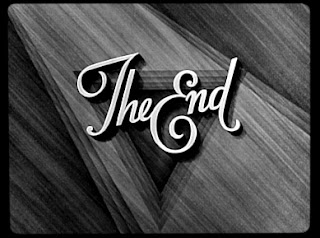Of course, this is exactly what you want people to do with your stories. You want those final words to hold onto people and force them to start conversations. But how is this done? Here are a few things to try:
- Delicious ambiguity - Spoiler alert for Inception. This movie ends with a spinning top that might be on the verge of falling - or might never fall. The sense of the entire story depends on what happens next, and the director does not let you see what happens. Which has led to endless discussions.
- An image - I think first here of the freeze frame that ended Butch Cassidy and the Sundance Kid, as they rushed to take on what looked like the entire Bolivian army. That shot was much imitated (diminishing its punch), but I think it worked because it showed action, but did not complete it. The audience could imagine the likely (hamburger heroes) or the unlikely, one more daring escape. I read The Grapes of Wrath decades ago, and I still can see the image of Rosasharn trying to save a starving man with the milk meant for her stillborn child.
- A mixed ending - One of my teachers called these bittersweet. The hero wins the race, but he loses his love. This is somewhat expected and isn't guaranteed to stay with readers, but it beats a pure happy ending.
- If only - Somehow a tragedy that happens only because nineteen things go wrong can get its hooks into you. You keep going back to see if one of those wrong turns might have been avoided. Were they all inevitable? Were some less inevitable? What would have happened if any of them went the other way?
- A good joke - This is a dangerous one because it can trivialize the whole story. Caper movies use this approach, and I think immediately of the ending of The Sting (I must be in a Newman/Redford mood) where the trick is turned. (Interestingly, Ocean's Eleven turns its trick, but has a powerful image ending - the almost religious assembly at the fountain.)
- A revelation - This may be the most powerful and difficult. If you can have an ending that reveals how society works, how people work - how WE work - in an elegant and satisfying way, people will hold onto that ending with both hands. To Kill a Mockingbird does this for me.
Also of Interest:

Some of these, like Ambiguity, are riskier than others. I suspect a lot of their success depends upon the power of the material that precede it.
ReplyDeleteA lot of stories involve some kind of personal journey, so a ceremony or spectacle at the end with some poetic resonance, like the Bellagio fountain in Oceans 11, seem to work and let audiences leave with a smile. Great post, though, Peter.
Hi, Rhonda I agree that the risk varies. There is an added level of risk that is connected with the skills of the writer and their taste. That fountain (plus the perfect music) was an unusual and unexpected choice. In other hands, it might not have worked.
ReplyDeleteAnd the biggest factor IS the preceding material. Not every choice is equal for your specific work. Even going for the buzz might not be the best choice. The ending of the original Star Wars, despite its attempt to tap into Triumph of Will, was not what had me buzzing when I left the theater. And Steel Magnolias ends with a light, tear-drying scene that takes the audience away from the punch of the real conclusion. Both of these have merit.
Thanks, Peter. I agree with Rhonda's assessment of the techniques. Excellent.
ReplyDeleteRegarding images, you said: "I think it worked because it showed action, but did not complete it." This strategy in the hands of a capable artist can create a memorable, intriguing book cover that speaks directly to the book's target audience.
Hi, Suzanne I agree that some of the best book covers also raise questions and draw in the reader. I have a friend who is a cover artist. Let me see if he'll join in here.
ReplyDeleteThanks for the comment!
Peter
I just read a book called CODE NAME VERITY by Elizabeth Wein where the ending took what was already a very good story and made it outstanding.
ReplyDeleteA CLOCKWORK ORANGE is another film where the end really put an amazing spin on the story and I think really burned it into the minds of the audience forever. FIGHT CLUB, as well.
-TRACY
Imagine how many extra people were drawn to these works because the endings were so effective. Imagine what a waste all that went before would have been if these had ended weakly.
ReplyDeleteThanks for commenting!
Peter